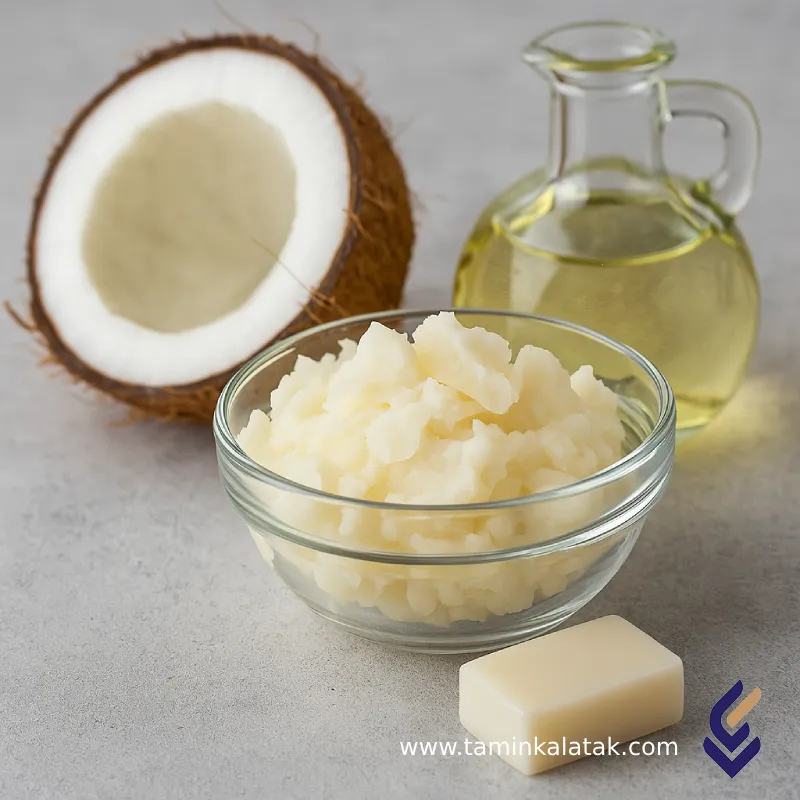Coconut Fatty Acid Diethanolamide
Coconut Fatty Acid is a natural mixture of saturated short- to medium-chain fatty acids obtained through the hydrolysis or saponification of coconut oil (Cocos Nucifera Oil).
Due to its unique molecular composition, it is widely used in cosmetic, personal care, detergent, and chemical industries.
Over 90% of its composition consists of saturated fatty acids, primarily:
| Component | Typical Content (%) |
|---|---|
| Lauric Acid (C12:0) | 45 – 52% |
| Myristic Acid (C14:0) | 16 – 21% |
| Capric Acid (C10:0) | 4 – 8% |
| Caprylic Acid (C8:0) | 5 – 10% |
| Palmitic Acid (C16:0) | Minor |
| Stearic Acid (C18:0) | Minor |
Chemical Structure
Coconut fatty acids are composed of saturated alkyl chains (C8–C18) terminated by a carboxylic acid group (-COOH).
This molecular structure gives rise to several key properties:
-
Short to medium carbon chains (C8–C14) for excellent surface activity
-
High saturation, ensuring strong oxidative stability
-
High reactivity, suitable for synthesis of soaps, esters, and amides
Physical and Chemical Properties
| Property | Typical Description |
|---|---|
| Physical State | Solid or semi-solid at room temperature |
| Odor | Mild, characteristic coconut scent |
| Iodine Value | Low (indicating high saturation) |
| Thermal & Chemical Stability | Stable under moderate heat and alkaline conditions |
| Biodegradability | Readily biodegradable; environmentally friendly |
| Origin | 100% plant-based, renewable (from coconut oil) |
| Skin Compatibility | Mild, non-toxic, suitable for sensitive skin |
| Antibacterial Properties | Naturally effective, mainly due to lauric acid content |
Functional Characteristics
-
High Surface Activity: Reduces surface tension effectively — ideal for surfactant production
-
Excellent Emulsification: Useful in personal care, detergents, and pharmaceutical formulations
-
Thermal and Oxidative Stability: More stable than unsaturated fatty acids under normal processing conditions
-
Eco-Friendly Profile: Fully biodegradable and derived from renewable resources
Applications
1. Detergent and Personal Care Industry
-
Production of natural and transparent soaps
-
Used in shampoos, conditioners, body washes, and shower gels
-
Raw material for foam boosters and mild surfactants (e.g., Cocamide DEA / MEA)
2. Cosmetic Industry
-
Ingredient in moisturizing creams, lotions, lip balms, and hair oils
-
Ideal for dry and sensitive skin formulations
3. Food Industry
-
Source of MCTs (Medium-Chain Triglycerides) used in nutritional and medical diets
-
Employed as antifoaming or emulsifying agent in food processing
4. Industrial and Chemical Applications
-
Intermediate for amide, ester, resin, and surfactant synthesis
-
Additive for plastics, coatings, lubricants, and adhesives
-
Bio-based raw material for biodiesel, epoxides, and bio-lubricants
Advantages
-
100% natural and renewable plant-based origin
-
Biodegradable and environmentally safe
-
High foaming performance in soap formulations
-
Excellent stability against heat and light
-
Gentle on skin, suitable for sensitive skin care products
-
Usable in MCT oil production for ketogenic and therapeutic applications
Limitations
-
Higher cost compared to animal- or petrochemical-derived fatty acids
-
May cause mild irritation in ultra-sensitive individuals
-
High saturated fat content requires controlled intake in food use
-
Solidification at low temperatures may affect appearance in some formulations
Market Information
Coconut fatty acid is one of the most widely used plant-based fatty acids due to its broad applicability and mild, stable nature.
Market price depends on factors such as purity, lauric acid content, country of origin, coconut oil price fluctuations, import costs, and currency exchange rates.
In the turkish market, it is available in bulk or drum packaging from various suppliers.
Industrial buyers are advised to review technical specifications (e.g., lauric acid percentage, iodine value, and melting point) before purchase to ensure product quality and performance.
Safety and Handling
| Aspect | Guidelines |
|---|---|
| Hazard Classification (GHS) | Generally non-hazardous in cosmetic and industrial grades |
| Skin Contact | May cause dryness or mild irritation in concentrated form – gloves recommended |
| Eye Contact | Direct contact may cause irritation – rinse thoroughly with water |
| Inhalation | No significant risk; ensure ventilation during melting or heating processes |
| Ingestion | Not suitable for ingestion in industrial grade; food-grade is safe within regulated limits |
| Storage Conditions | Keep in a cool, dry, well-ventilated area; avoid direct sunlight and moisture |
Summary
Coconut Fatty Acid is a versatile, renewable, and eco-friendly ingredient derived from natural coconut oil, offering excellent surface activity, stability, and skin compatibility.
It serves as a key raw material in soaps, surfactants, cosmetics, and bio-based industrial formulations, combining performance, sustainability, and safety in one solution.
Applications
| Applications | , , , |
|---|
Coconut Fatty Acid Diethanolamide
| Products | Melting point | Density (at 20°C) | Grade | Chemical formula | CAS number | Solubility in water | Vapor pressure | Physical appearance |
|---|---|---|---|---|---|---|---|---|
| Fatty acids, C8–C18 and C18‑unsaturated (mixed coconut fatty acids) | About 20–28 °C (average about 24–28 °C) | Approximately 0.84–0.86 g/cm³ (Acme-Hardesty); 0.92 g/cm³ (PubChem – coconut oil) | Industrial grade; cosmetic/food grade available with additional purification | Mixed – includes C₈H₁₆O₂, C₁₀H₂₀O₂, C₁₂H₂₄O₂, C₁₄H₂₈O₂ and other saturated/unsaturated acids | 61788‑47‑4 | Approximately 0.113 g/L at 20 °C; almost insoluble | < 1 mmHg (≈<133 Pa) at about 131 °C | Clear to translucent, white or light yellow oily liquid, semi-solid at lower temperatures |







